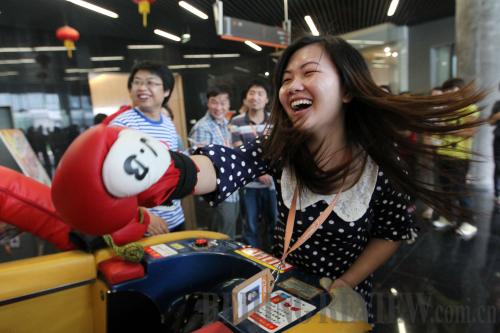|
 |
|
GROUP THERAPY: Workers at Alibaba Group take part in a recreational sports activity in the company's headquarters in Hangzhou, Zhejiang Province, on June 1, 2011, which was initiated to relieve workplace pressure (XINHUA) |
Liu Qi, a research fellow with the Institute of Sociology at the Shanghai Academy of Social Sciences, has conducted case studies on deaths from overwork. He found out that alleged karoshi victims in China died at 44 on average. Those succumbing to exhaustion in the IT industry died even earlier, at 37.9 years of age.
According to Liu's studies, IT professionals in general suffer from long overtime, night shifts, immobility and nervousness.
Money matters
A recently released survey indicated nearly eight out of 10 Chinese workers became more stressed in the past year, making them the most stressed professionals in the world.
Some 75 percent of Chinese workers are feeling more pressure this year than last, according to the poll conducted in September by serviced office space provider Regus.
The survey, which canvassed the opinions of more than 16,000 workers worldwide, concluding China held the highest rate of increasing stress levels of all the countries polled. The leading causes of stress were identified as employment, finances and customer demands.
The poll said that the stress levels rose for 45 percent of workers in Japan and 58 percent of those in Germany, which came second in Regus' rankings of increased stress.
The Regus survey results were echoed by several domestic surveys. A survey conducted by Chinahrd.net, a website for human resources professionals, revealed that more than 80 percent of employees in China work overtime regularly. The China National Radio reported that only 30 percent of employees in China enjoy a paid holiday. According to a recent survey on 1,000 office workers of all age groups in seven major Chinese cities, two thirds of the respondents said that they are in a poor state of health and blamed work pressure, environmental pollution and a sedentary lifestyle for their imperfect health.
Even worse, workplace pressure could deteriorate Chinese people's mental health as ongoing pressure can cause depression. A 2010 study by medical journal Lancet estimated that roughly 173 million Chinese suffer from a mental disorder. Roughly, it means that nearly one in five adults has a mental disorder, as defined by the Diagnostic and Statistical Manual of Mental Disorders.
Chinese workers are indeed experiencing more pressure from work than before, said Xiao Minzheng, Director of Peking University's Center for Human Resource Development and Management Research.
"China has yet to improve its housing, healthcare and pension systems, and that's why Chinese workers are under more pressure," said Xiao.
Xia Xueluan, a sociology professor at Peking University, said that because China's social safety net cannot guarantee individuals' benefits in health care, pension and children's education, individuals are under intense pressure to acquire wealth, especially middle-aged professionals who have to support their parents and children.
Xia said that China's traditional teachings, especially those of Confucius, have also given people a lot of peer pressure. "Competitiveness in many workplaces originates from Chinese parents' tendency to push their children to excel in schools and their careers," he said.
Hu Yinglian, a lecturer at the Chinese Academy of Governance, told China Youth Daily that besides work pressure, people become anxious due to the existence of social unfairness and a yawning income gap. "Many people feel deprived, whic h further poisons the shallow social culture glorifying the pursuit of material wealth," he said.
Netizens in various Chinese cities participated in a popular online survey inquiring about the amount of "monthly income needed for a panic-free life" earlier this year. It revealed that a person needed to earn around 9,000 yuan ($1,429) a month to avoid "feeling panic" in big cities like Beijing and Shanghai and around 5,000 yuan ($794) in smaller cities like Dalian and Tianjin. These "ideal" incomes are without exception much higher than actual average personal salaries in these cities.
Email us at: lili@bjreview.com | 